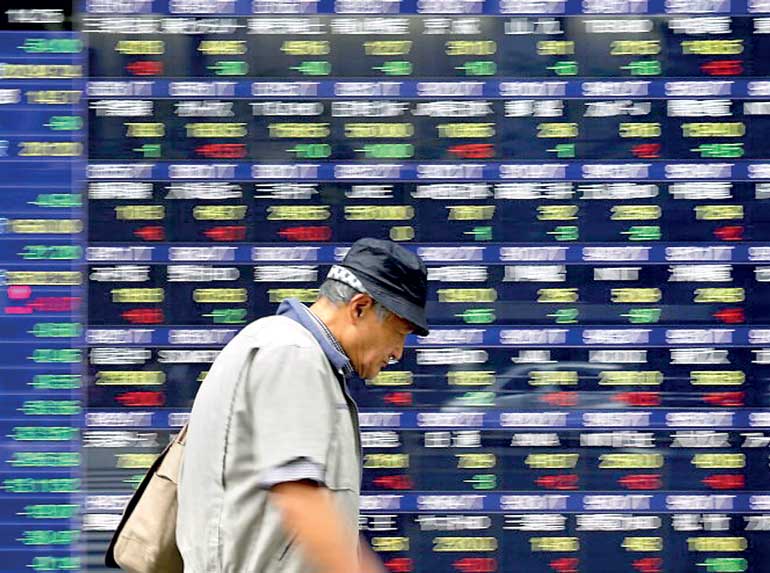Tuesday Mar 04, 2025
Tuesday Mar 04, 2025
Thursday, 1 February 2018 00:00 - - {{hitsCtrl.values.hits}}

TOKYO (Reuters): Asia stocks pulled further back from record highs on Wednesday as the recent rise in global bond yields weighed on equities, while the dollar steadied ahead of the Federal Reserve’s policy decision.
In his first State of the Union address since becoming US President, Donald Trump urged Republicans and Democrats to work toward compromises on immigration and infrastructure and implement legislation that generates at least $1.5 trillion for new infrastructure investment. Market reaction to the address was limited.
MSCI’s broadest index of Asia-Pacific shares outside Japan added to the previous day’s losses and dipped 0.2%, after reaching a record high on Monday.
South Korea’s KOSPI rose 0.3% and Japan’s Nikkei dropped 0.1%.
Hong Kong’s Hang Seng shed 0.55% Shanghai retreated 0.6%.
Wall Street, which has recently hit a succession of record peaks, has led a global equities rally over the past year thanks to strong world growth fuelling higher corporate earnings and stock valuations.
But the recent surge in US long-term bond yields to near four-year highs have poured cold water on the rally.
US stocks fell for a second straight day on Tuesday, with the Dow registering its biggest two-day drop since September 2016, pressured by healthcare stocks and rising bond yields.
“The key point is the speed of the latest rise in yields, which has been very rapid. Until recently the yield rise helped the financial sector, but the pace of the rise is now too rapid and raising worries about corporate borrowing costs,” said Junichi Ishikawa, senior FX strategist at IG Securities in Tokyo.
Higher yields are seen hurting equities as they increase borrowing costs by companies and reduce their risk appetite. Higher yields also present a fresh alternative to investors, who may choose to allocate some of their money from equities to bonds.
The US Treasury 10-year note yield touched its highest in nearly four years overnight at 2.733%, while 30-year bond yield climbed to its highest since May 2017.
Yields rose after the start of the Federal Reserve’s two-day meeting on Tuesday, which could offer more clues on the central bank’s economic and rate hike outlook.
The greenback failed to draw much support from higher Treasury yields as the risk-averse mood favoured its peers like the yen.
The dollar was a shade higher at 108.900 yen. It briefly popped up to 109.095 after the Bank of Japan increased its buying of JGBs of three- to five-year maturities at a regular debt-purchasing operation, a move seen as a warning shot against further rises in JGB yields.
The euro nudged up 0.15% to $1.2420, adding to modest overnight gains.
The dollar index against a basket of six major currencies was at 89.106, having crawled away from a three-year low of 88.438 set on Friday.
LONDON (Reuters): Oil prices fell for a third day on Wednesday after data that showed US inventories rose more than expected, but crude was still on track for its biggest gain in January in five years.
Brent crude, the global benchmark, was down 42 cents at $68.60 a barrel by 1235 GMT, after touching a two-week low earlier in the day. US West Texas Intermediate (WTI) was down 44 cents at $64.06, adding to Tuesday’s losses.
Despite Wednesday’s weakness, prices are still on track for a fifth month of gains and Brent is set for its largest percentage January rise since 2013, with a 2.7% increase.
Higher prices, however, have encouraged US producers to increase their rig count. Energy companies added 12 oil rigs last week, the biggest weekly increase since March.
Discover Kapruka, the leading online shopping platform in Sri Lanka, where you can conveniently send Gifts and Flowers to your loved ones for any event including Valentine ’s Day. Explore a wide range of popular Shopping Categories on Kapruka, including Toys, Groceries, Electronics, Birthday Cakes, Fruits, Chocolates, Flower Bouquets, Clothing, Watches, Lingerie, Gift Sets and Jewellery. Also if you’re interested in selling with Kapruka, Partner Central by Kapruka is the best solution to start with. Moreover, through Kapruka Global Shop, you can also enjoy the convenience of purchasing products from renowned platforms like Amazon and eBay and have them delivered to Sri Lanka.
Discover Kapruka, the leading online shopping platform in Sri Lanka, where you can conveniently send Gifts and Flowers to your loved ones for any event including Valentine ’s Day. Explore a wide range of popular Shopping Categories on Kapruka, including Toys, Groceries, Electronics, Birthday Cakes, Fruits, Chocolates, Flower Bouquets, Clothing, Watches, Lingerie, Gift Sets and Jewellery. Also if you’re interested in selling with Kapruka, Partner Central by Kapruka is the best solution to start with. Moreover, through Kapruka Global Shop, you can also enjoy the convenience of purchasing products from renowned platforms like Amazon and eBay and have them delivered to Sri Lanka.